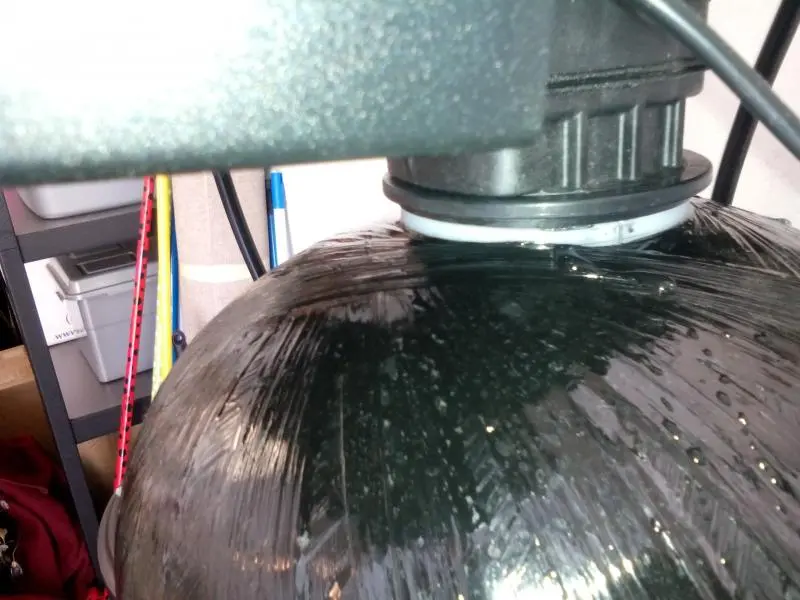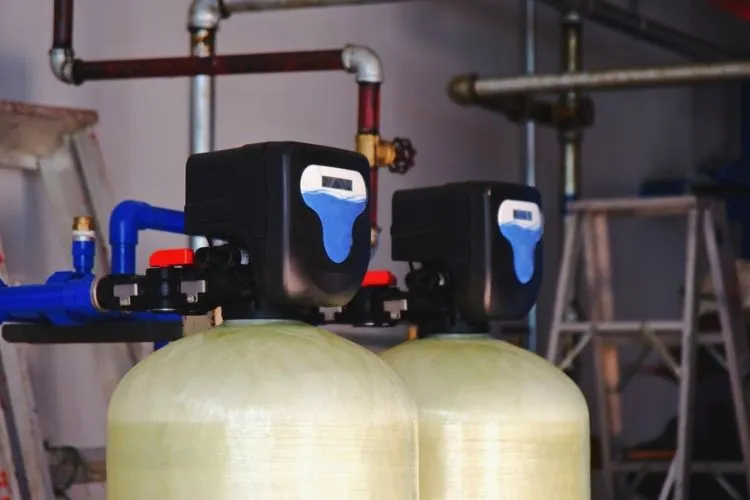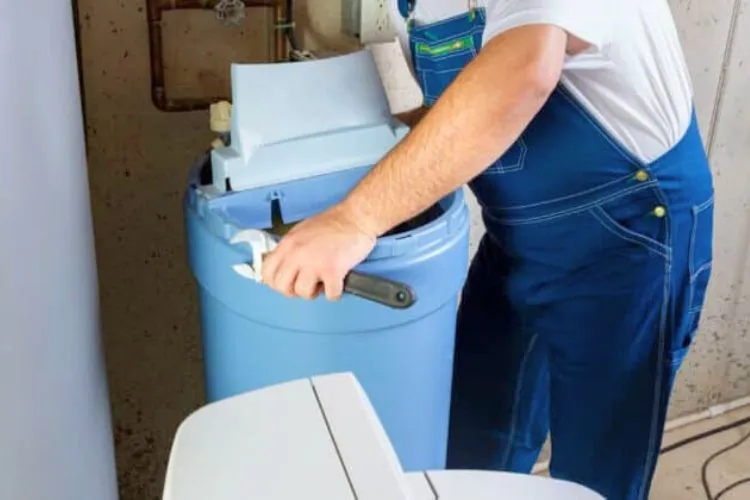A water softener plays a vital role in ensuring your home enjoys soft, mineral-free water. At the heart of this system lies the resin tank, critical for the water softening process.
But, is your water softener resin tank leaking from bottom? I am sure, it is, and that’s why you have landed on this page to know the reasons and solutions.
This article will explore the causes, signs, and steps you can take to resolve this issue, ensuring your water softening system returns to its optimal function.

💦 Water Softener Resin Tank Leaking From Bottom?
A resin tank is where the magic of water softening happens. It contains resin beads that remove minerals like calcium and magnesium from your water.
These minerals cause water hardness, leading to scale buildup in pipes and appliances. Understanding the function of the resin tank can highlight the importance of promptly addressing leaks.
💦 Identifying Signs of a Leaking Resin Tank
The first step is to recognize the signs of a leak. Look for water pooling at the base of your water softener. You might also notice a decrease in water pressure or changes in water quality. Ignoring these signs can lead to more serious damage over time.
💦 Why Is Your Resin Tank Leaking?
Several factors can cause your resin tank to leak.

- Age and Deterioration: Like all components, resin tanks can wear out over time. Continuous exposure to water, pressure, and the water softening process itself can cause the tank’s material to deteriorate.
- Improper Installation or Maintenance: If not installed correctly, your resin tank might be under undue stress from the start. Lack of regular maintenance can also lead to issues that result in leaks.
- High Water Pressure or Temperature: Extreme conditions can weaken the tank. Sudden changes or consistently high levels of pressure or temperature are harmful in the long run.
- Physical Damage: Any external damage or cracks, even if minor, can gradually worsen and lead to leaks.
💦 Troubleshooting and DIY Solutions
Addressing a leak in your resin tank demands a methodical approach. Start by inspecting the tank for visible damage or wear.
If you spot cracks or evident signs of deterioration, the tank might need replacement. For issues like loose connections or minor damage, here are steps you can take:
- Turn off the water supply and power to your water softener.
- Drain the tank and carefully inspect all connections and the tank itself for signs of the leak.
- Tighten any loose fittings. Use plumber’s tape to ensure a watertight seal.
- If you find small cracks, you might be able to use a resin tank repair kit designed for minor damage.
Remember to follow safety guidelines during this process. If you’re not comfortable performing these steps, or if the damage seems beyond minor DIY repairs, it might be time to call a professional.
💦 When to Call a Professional?
Some situations are best left to professionals. If your tank is old and showing significant wear, or if you’ve attempted repairs with no success, professional help is advisable.
Professionals can offer solutions, from repairing to replacing components, ensuring your system functions correctly.
💦 Prevention Tips for Future Leaks
Preventing future leaks starts with regular maintenance. Monitor your water softener’s performance, check for signs of wear, and schedule regular inspections.
Keep an eye on water pressure and consider installing a water pressure regulator if needed. Annual check-ups by a professional can also help catch issues before they turn into leaks.
💦 Tools and Materials Needed
Essential Tools List
When preparing to tackle repairs on a leaking water softener resin tank, having the right tools on hand is crucial. The essential toolkit should include:

- Adjustable wrenches: For tightening and loosening fittings.
- Plumbers tape: Also known as thread seal tape, used to create watertight seals at threaded joint connections.
- Pipe cutters: Necessary if any piping adjustments are required.
- Screwdrivers: For opening up the water softener unit and adjusting components.
- Flashlight or work light: To improve visibility in tight spaces.
- Bucket: For catching water as you drain the tank or deal with the leak.
For those who prefer a simpler route or are facing more complex issues, maintaining a contact list of local professionals or the customer support of your product could be equally essential.
Materials Shopping Guide
Success in DIY repairs often comes down to the quality of the materials you use. Here’s a guide to what you might need:
- Resin tank repair kit: For patching up smaller cracks or damage.
- Replacement Parts: Depending on the diagnosis, you may require specific parts like a new resin tank, O-rings, or valves.
- Food-grade silicone sealant: Useful for creating waterproof seals around fittings and potential leak points.
- Resin beads: In cases where you need to replace or top up the resin after a leak has been fixed.
Shopping for these materials at hardware stores or purchasing them online from reputable suppliers are both viable options. Always double-check compatibility with your specific water softener model before making any purchases.
💦 Frequently Asked Questions (FAQs)
What causes water softener tanks to start leaking?
Several factors, including age, wear and tear, improper installation, high water pressure or temperature, and physical damage, can cause leaks in water softener tanks.
Can I repair a leaking resin tank myself, or should I call a professional?
Minor issues like loose fittings or small cracks might be manageable with DIY solutions. However, for significant damage or if DIY repairs don’t resolve the leak, seeking professional help is recommended.
How can I prevent future leaks in my water softener resin tank?
Regular maintenance, including inspecting your system for signs of wear, monitoring water pressure, and getting annual check-ups by professionals, can help prevent future leaks.
Conclusion:
A leaking water softener resin tank can seem daunting, but understanding the causes and solutions can make it manageable. With the right approach, you can fix the issue or make an informed decision on when to call a professional.
Taking preventive steps can also help avoid future leaks, ensuring your water softening system remains effective for years to come.
Addressing a leak in your water softener resin tank promptly and efficiently ensures your system continues to provide soft, scale-free water, safeguarding your home’s plumbing and appliances against the damage caused by hard water.

Devon Shorts, a seasoned expert with over a decade of experience in water safety, shares valuable insights on this blog “Aqua Safety Plus”. Trust his expertise to keep your water clean and your family safe.
